Leading Complex Projects
Leading Complex Projects
Go Deeper with Certificate Programs
Leading Complex Projects is part of a certificate program:
What You'll Learn
 Week 1: Introduction - Explore Complexity
Week 1: Introduction - Explore Complexity
Watch a sneak peek
-
Leading Complex Projects — A sneak peek of the course
1 Video Lesson
-
Complex Project Leadership — Guiding both the work and the team
1 Meditation
-
Develop Awareness of Your Intuition: In this meditation, you will explore the associations you have to intuition and start to cultivate your intuitive abilities through focused attention and awareness.
1 Assignment
-
Visualize a Complex Project: When you see or hear the words “complex project”, visualize what comes to mind and describe what it means to you.
1 Discussion
-
The Feeling of Complexity: Recall a time when things got complex on a project you were working on. How did it make you feel?
 Week 2: Enable Outcomes
Week 2: Enable Outcomes
5 Video Lessons
- Articulate the Why — Defining the purpose of the project
- Mentor Moment — The importance of naming the project
- The Power of Simplicity — Guiding principles and their benefits
- Leading Through Generosity — Strategies for motivating others
- The Project of Self — Becoming a more self-aware project leader
1 Assignment
-
Craft Your Project Purpose Statement: In this assignment, we’ll guide you through the steps to understand and define your project’s underlying need, intended audience, and desired impact, and synthesize them into a simple and concise statement of purpose.
5 Discussions
-
The Importance of Purpose: Think back to a personal or professional project where you assumed you knew the purpose but later learned that your assumption may have been off the mark. What impact did this have on you and the outcomes of the work?
-
The Name Game: What surprises you about Shuya’s opinion on naming projects, and what feels most helpful about the tips she’s shared?
-
Guiding Principles: If you already use some form of guiding principles in your work, what impact did they have on a past or present project? If you don't currently use them, what opportunities do you have for crafting guiding principles, either individually or collectively?
-
Emotional Triggers: What was the last strong emotion that surfaced for you at work? Describe the circumstances and the behaviors you adopted in response. How might you react to this same situation or emotion in the future?
-
A Personal Connection: When was a time someone identified a personal passion or interest in you and created an opportunity for you to connect that with your work? What impact did it have on you and the outcomes of the work?
 Week 3: Design Alignment
Week 3: Design Alignment
4 Video Lessons
- A Systems View — Mapping and visualizing the project network
- Mentor Moment — Understanding different mental models
- Collective Communication Techniques — Building a shared understanding
- From Obstacle to Advantage — Tips for utilizing disagreement
1 Assignment
-
Map the Project System: In this assignment, you will create a systems map of your project that visualizes each stakeholder and the exchanges of information between them. You will use this map to spot opportunities to improve or repair alignment.
4 Discussions
-
Aligning Stakeholders: Think about a project you worked on that involved a lot of stakeholders with different perspectives. How did you try to create alignment and bring people along?
-
Mental Models That Differ from Our Own When we encounter a mental model that differs from ours, often our natural reaction is to assume the other person is wrong or misinformed. How do you commonly respond to a different mental model, and how would you like to respond differently going forward?
-
Collective Knowing: We’ve shared a few ways to create collective knowing through group communication. Choose one technique you’ve used before. How did it go?
-
Separate the Person from the Behavior: We have a tendency to label behaviors, but when we label someone as a naysayer, we communicate and assume that they are always that way. We see it as a situation of them versus us. Reflect on a time when you were the dissenting voice or you wanted to be, but couldn’t share your thoughts. How did that feel? How were others helpful to you or harmful in that moment?
 Week 4: Leverage Intuition
Week 4: Leverage Intuition
3 Video Lessons
- Beyond Reason — The value of intuition in complex situations
- Sensing Opportunities — Strategies for surfacing intuition
- Got a Hunch, Now What? — Methods for testing your intuition
1 Meditation
-
Investigate Your Intuition: In this meditation, you will explore your reactions and responses around an intuition to determine if what you are experiencing is a genuine intuition or a bias, assumption, or strong emotion.
1 Assignment
-
Analyze Your Intuition: Our intuitions can be a valuable source of information when we need to make decisions, solve problems, or foresee conditions. In this assignment, you will practice surfacing and analyzing your intuitions to identify patterns and insights.
3 Discussions
-
Intuition In Your Own Words: What is intuition to you? Have you ever had an intuition that turned out to be right? Describe what happened and what you learned from the experience.
-
Welcome Intuition: Look across the seven strategies for surfacing intuition. Have you tried one of them before? What was the challenge you were facing and the result of using this strategy?
-
When Intuition Misleads: Think about a time when you acted on an intuition without thinking—and your intuition led you astray. Was there an underlying assumption, emotion, or bias that clouded your judgment? What happened and what did you learn from the experience?
 Week 5: Conclusion - Build Resilience
Week 5: Conclusion - Build Resilience
2 Video Lessons
- Beyond the Project — How genuine relationships elevate outcomes
- The Most Complex Project of All — Applying lessons from projects to everyday life
1 Assignment
-
Make a Plan: Reflect on what you have learned about yourself as a project leader along this journey, and make a plan for how you will continue to apply the mindsets and tools for leading complex projects.
2 Discussions
-
Relationships and Resilience: Nothing builds our resilience more than relationships. How do you personally foster meaningful relationships with people in your projects?
-
Life Lessons: Recall a time when you faced uncertainty in your own life outside of work. How did you navigate the situation and what was the outcome?
Meet Your Instructors
Katie Soven
Former Senior Portfolio Director at IDEO
Trained as an architect, Katie understood that a systems approach to problem solving can be applied to complex problems and situations. Her work at IDEO included innovating with clients across the retail, hospitality, automotive, civic, and financial service spaces. She was passionate about the future of work and supported organizations on their transformation journey by creating jobs that are fulfilling, rewarding, and sustainable.
Katie received a master’s degree in Architecture from Harvard University and a bachelor’s degree in Architecture from the University of Florida.
Dwayne Edwards
Former Executive Portfolio Director at IDEO
As a former intelligence officer in the United States Marine Corps, Dwayne empowers organizations to navigate complexity and engage with people in real and lasting ways that support business and society. This can look like new products, services, or capabilities designed for human needs. Before joining IDEO, he worked as a product manager at Volvo Cars of North America where he helped develop Volvo’s subscription model and built stronger relationships between retailers and customers.
Dwayne received his MBA from the Yale School of Management, a master’s degree in Criminal Law and Procedure from John Jay College of Criminal Justice, and a bachelor’s degree in Philosophy, Politics, and Law from Binghamton University.
FAQs
We offer three types of courses: self-paced courses, cohort courses, and certificate programs. Cohort courses run on a set calendar, with fixed start and end dates. Course learning is self-paced within those dates and requires approximately 4-5 hours per week over 5 weeks. Courses consist of videos, activities, assignments, access to course teaching teams, and feedback from a global community of learners. There are also optional 1-hour video Community Conversations, held weekly by the teaching team.
All of our cohort courses are fully online, so you can take them from any time zone, anywhere in the world. With our cohort course experience, while you'll be learning alongside other learners, you'll still have the flexibility to work at the pace that fits your own schedule. There aren’t mandatory live components, so you don't have to worry about having to log in at a specific time. At the same time, you'll have access to a teaching team, which is composed of experts in the field who are there to provide you feedback, and there are also plenty of options to connect with your fellow learners.
Course instructors have a strong presence in the courses through the course videos, but they're not actively providing feedback or holding direct conversations with our learners. We have a teaching team to ensure that you have the feedback, guidance, and support you need to learn successfully in your course. Our teaching team members are design practitioners that have experience applying course methods and mindsets in a wide variety of contexts around the world.
Our teaching team consists of teaching leads and teaching assistants, who are experts in their fields. Many of them have been with IDEO U for many years, and we have selected those who have direct experience with applying the course methods and mindsets in all sorts of contexts around the world. They all go through multiple training sessions by our instructional designers on not only on the subject matter, but also on how to create safe and collaborative learning experiences and environments.
Community Conversations are one-hour live video conversations hosted by the teaching team on Zoom. These happen once per week, with each one having two to three time options to accommodate different time zones. Each week focuses on the lesson that you’ve just gone through, so the output and the content depend on the specific lessons. You'll have the opportunity if you work together with your peers on the tools and mindsets from the course, reflect on what you’ve learned, and also address any challenges that you might be going through.
All course materials, including videos, activities, and assignments will be available while you are enrolled in a course. During the 5 weeks of the course, you will have full access to our learning platform and can refer back to it any time. You will only have access to the course materials while you are enrolled.
Assignments must be submitted during the 5-week course duration in order for you to receive a certificate of completion.
Absolutely! We have had many teams go through our courses together. For those taking our courses as a team, we provide a number of additional benefits:
1. A Team Learning Guide, developed to provide your team with resources to facilitate offline discussions that complement the in-course experience.
2. A Manage Learners function, which provides visibility into your team's progress within the course.
3. The ability to create a private Learning Circle, which is a closed space for discussion on the learning platform specifically for your team.
For more information, visit our Team Learning page.
We offer a discount when you enroll in multiple courses at the same time through some of our certificate programs, including Foundations in Design Thinking, Business Innovation, Human-Centered Strategy, and Communicating for Impact.
You can also enter your email address at the bottom of this page in order to receive updates on future offers or possible discounts.
We also offer financial assistance for teachers, students, nonprofit workers, and those in need of government assistance – check out the financial aid application for more information and to apply for financial support. Please allow some time for the verification to process, so plan ahead if you are looking to join a course soon.
After completing a cohort course, you will be able to add it to your “licenses and certifications” on LinkedIn.
We also have certificate programs that consist of multiple courses. After completing a certificate, you will receive a certificate of completion via email as a downloadable PDF within 1-2 weeks of completing the final required course. Certificates are configured for uploading and sharing on LinkedIn.
You can purchase a course on our website using a credit card, PayPal, or Shop Pay. For US customers, we also offer installment plans at checkout if you use the Shop Pay method of payment.
We typically are not able to accommodate bank transfer or invoicing. However, if your order includes 10 seats or more, please contact hello@ideou.com and our team will be happy to review your request.
Collaborate with a Global Community
Work with Expert Coaches
Our teaching team has extensive applied industry knowledge. They'll help deepen your understanding and application of the course content by facilitating written discussions, live video moments, and assignment feedback.
Expand Your Network
Join virtual live discussion groups for deeper conversation, reflection, and connection led by teaching team members and available multiple times a week across time zones.
Receive Feedback
Gain tips, techniques, and a downloadable feedback guide; and share and receive feedback on assignments from peers.
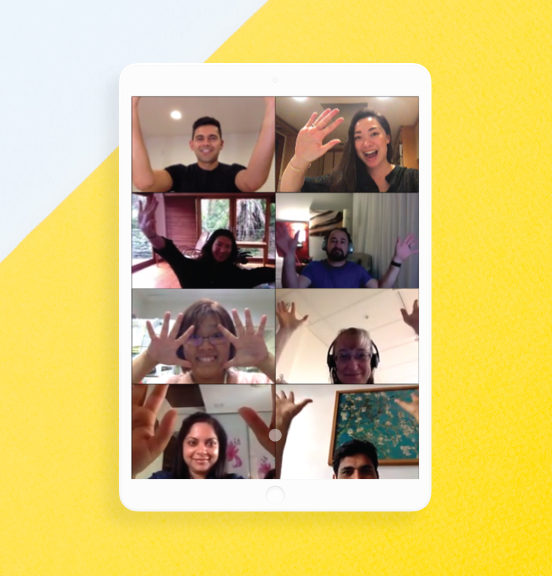
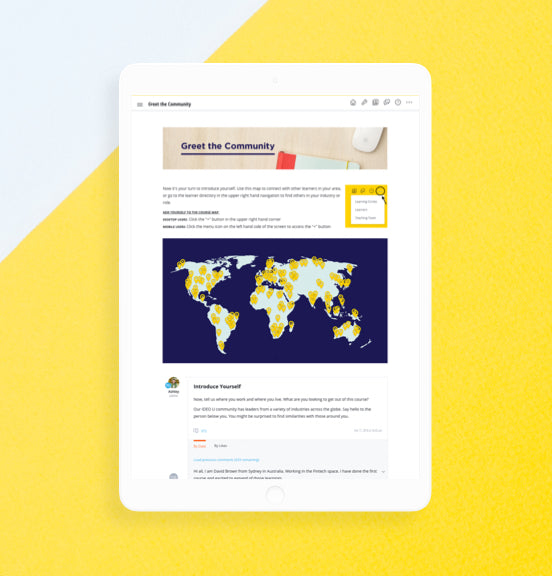
Loved by Learners Across the Globe
Leading Complex Projects
Cohort Course“I was blown away from the diversity of instructional methods used. I absolutely loved the workbook and accompanying content. The activities and assignments were so well designed for pushing me to learn new things in a way that felt approachable despite requiring deep thought and perspective shifts.”
Leading Complex Projects
Cohort Course“I really enjoyed this course. A lot of times you take trainings that you can't really bring back to your company and implement. This is the first course within my 13.5 year career that was 100% relatable to my company.”
Leading Complex Projects
Cohort Course“I found this course extremely helpful in getting foundational ideas about leadership into my mind, behavior, and vernacular. The insight I gained in the first IDEO U course I took are with me today 3 years later. Ensuring you have the time and bandwidth to focus on learning is critical to the success of these courses.”
Leading Complex Projects
Cohort Course“The lessons are fresh and robust with tangible ways to apply the lessons to your everyday. The content doesn't feel like the same stuffy lessons you find elsewhere.”
Learners Also Purchased
-
Cultivating Creative Collaboration
Learn to lead collaborative teams from Mike Peng, CEO of IDEOCohort Course 5 Weeks- Regular price
- $899
- Sale price
- $899
- Unit price
- per
-
Designing for Change
Start small, start with people, start nowCohort Course 5 Weeks- Regular price
- $899
- Sale price
- $899
- Unit price
- per
-
From Superpowers to Great Teams
Activate greatness in yourself and othersSelf-Paced Course Start Anytime- Regular price
- $250
- Sale price
- $250
- Unit price
- per

Enroll As a Team
The practice and application of design thinking, innovation, and creativity is highly collaborative and team based—which is why we believe that learning is better together. Take a course as a team and develop new skills and mindsets, have deeper discussion during course kickoff and debrief sessions, and build a shared understanding.

